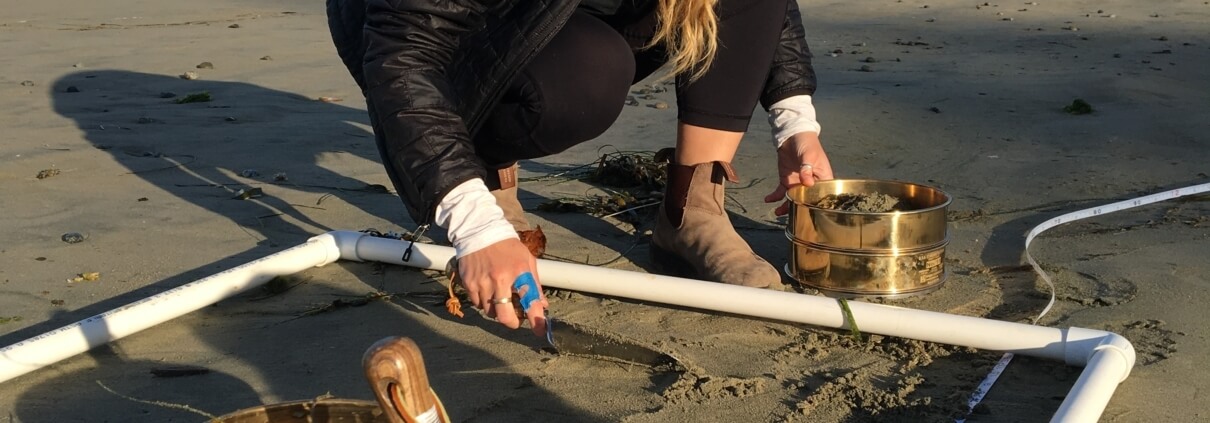Return-It and the Pacific Salmon Foundation support local community research on microplastics on the B.C. coast
Ucluelet Aquarium’s ‘citizen science’ project reveals recurring patterns about the volume and types of microplastics present
Ucluelet, B.C. – November 10, 2021 – The problem of plastics in the ocean may conjure images of debris washing up on beaches, but it is microplastics – particles up to 5mm – that pose an almost invisible challenge in oceans worldwide, including here on the B.C. coast. A new partnership between Return-It and the Pacific Salmon Foundation is aimed at shedding new light on microplastics in the marine environment in B.C. in order to make clean-up efforts more effective.
A ‘citizen science’ project being undertaken by the Ucluelet Aquarium – now funded by Return-It and the Pacific Salmon Foundation – has found recurring patterns in the distribution and types of microplastics along the west coast of Vancouver Island since 2017.
The aquarium’s Microplastic and Marine Debris Initiative has found that microplastics on western Vancouver Island are predominantly present in the winter months when tides are higher and ocean currents are stronger.
“By understanding recurring patterns about the volume and types of microplastics present, we can ensure that future beach clean-up projects on the B.C. coast are strategically timed to remove more debris,” said lead researcher Sophie Vanderbanck, Marine Debris Coordinator & Biologist with Ucluelet Aquarium. “One of our goals with this initiative is to build awareness of the microplastic issue that is facing us globally and locally, through engaging our volunteer citizen scientists, the community and visitors to the aquarium.”
“Research is vital if we are to better understand and identify solutions to managing this almost invisible challenge of microplastics on B.C. coasts,” said Allen Langdon, CEO of Return-It. “This partnership with the Pacific Salmon Foundation reflects Return-It’s commitment to protecting our environment by diverting plastic and other material from our oceans and waterways. In B.C., we are fortunate to have many ways to recycle and manage material — there is no reason for it to end up in our ocean and waterways.”
“Microplastics may seem small, but they can have lasting impacts on salmon habitat and sea life of all kinds,” said Michael Meneer, President and CEO of the Pacific Salmon Foundation. “Thanks to community leadership with our partners Return-It and the Ucluelet Aquarium, we can help keep dangerous microplastics out of salmon habitat and better protect our coastal ecosystems.”
The Ucluelet Aquarium’s research began in 2017 and is part of a growing trend of citizen science that enables large volumes of data collection while offering a collaborative way for individuals to become involved in education, research and community engagement. Volunteer citizen scientists, guided by Ucluelet Aquarium researchers, gather monthly to collect and sample microplastics found along local beaches in the Ucluelet-Tofino area.
Through the partnership with Return-It, the Pacific Salmon Foundation will have funding to dedicate to microplastic initiatives, and the two organizations will be working together to raise awareness about microplastics and their impact on ecosystems.
More about microplastics
Microplastics are categorized as plastics up to 5mm in size. There are three main types of microplastics found on west coast beaches: hard plastics, nurdles (small plastic beads used to produce larger plastic materials), and styrofoam.
- In the ocean, plastics are often mistaken for food and once ingested, give fish and other animals a sensation of being full – leading to starvation.
- Microplastics contain toxins which accumulate up the food chain (known as bioaccumulation), leading to high toxin levels in larger animals, including humans.
- Results from Ucluelet Aquarium’s monthly samples taken so far in 2021 at Wickanninish Beach show the majority of microplastics come from hard plastics, and the highest volumes collected for all microplastics was in February. The highest volumes prior to that were in December 2020 and February 2019.
Did you know?
Return-It recycles approximately 1 billion beverage containers a year, saving enough energy to power more than 40,000 homes for a full year. When we recycle, we are not just saving reusable raw materials. We are saving energy, trees and clean air.
Return-It
Return-It is an industry owned, not-for-profit, product stewardship agency with beverage container management as its core business. Its mandate is to develop, manage and improve systems to recover used packaging and end-of-life products from consumers to ensure they are properly recycled and diverted from the natural environment. This work includes the development and implementation of initiatives that provide new solutions to reduce waste, such as its province-wide program to repurpose and recycle used clothing and other textiles. Return-It is a founding member of the Canada Plastics Pact, and has made a global commitment through the Ellen MacArthur Foundation to help eliminate plastic pollution at the source. In 2021, Return-It broadened its commitment to sustainability by announcing its social purpose, which is aimed at creating a better future for people, communities and the planet: We exist to foster a world where nothing is waste. Return-It.ca
Pacific Salmon Foundation (PSF)
PSF is the independent, thoughtful leader and catalyst in conservation, restoration, and enhancement of Pacific salmon and their ecosystems through strategic partnerships and leveraged use of resources. www.psf.ca
Ucluelet Aquarium
Ucluelet Aquarium’s mission is to raise awareness about local marine biodiversity and promote respect for the ocean environment. The aquarium greets visitors from all over the world, treating them to a very personal view of the fish and invertebrates from local waters in Clayoquot and Barkley Sounds.
Media contact:
Cathleen Mo, 778-886-2281
cathleen.mo@fhhighroad.com



